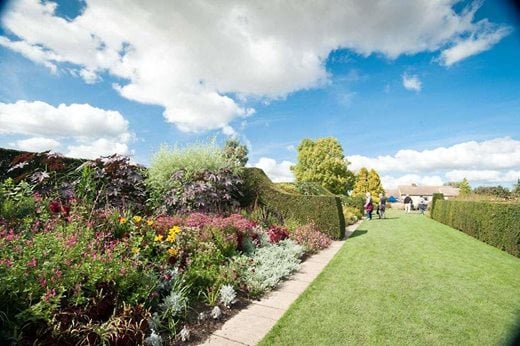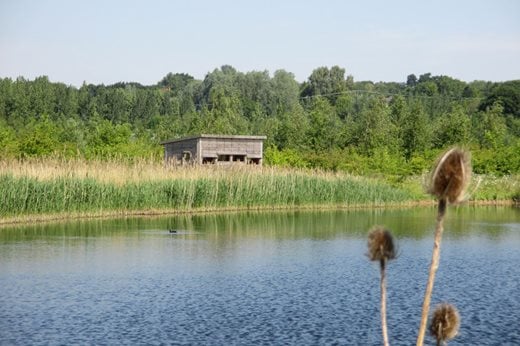RHS Garden Hyde Hall enjoys good relations with the local community and has forged good relationships with a number of organisations
Essex & Suffolk Water (ESW)
-in-late-summer-at-RHS-Hyde-Hall-_MAR0010395_106522.jpg?width=520&height=346) Over the years Essex and Suffolk Water has generously helped fund a number of key projects to enhance the garden and educate our visitors about using water wisely. Projects have included:
Over the years Essex and Suffolk Water has generously helped fund a number of key projects to enhance the garden and educate our visitors about using water wisely. Projects have included:
Reservoir - with help from ESW we constructed a 45-million litre (10 million gallon) reservoir (pictured above). The reservoir collects rainfall and irrigation runoff from the garden, maximising our ability to store this valuable natural resource.
Farmhouse Garden – the sharp crisp lines of clipped hedging and formal hard landscaping provide the perfect setting for a strongly coloured planting scheme.
Dry Garden – this was a major project and now showcases the fantastic range and style of plants you can grow to cope with drought and exposure to high light levels (pictured above).
Weather station - weather has an important effect on day to day horticultural practices. The station gives us an accurate system of recording data and any patterns that demonstrate climate change.
Vegetable plots – when the RHS embarked upon a ‘Grow Your Own’ campaign, ESW helped us create a number of 3m x 3m beds that show different methods of cultivation and cropping.
British Sugar (Topsoil)
The lush green lawns at Hyde Hall are much admired by all and that’s down to the care and attention of two staff members whose job it is to keep them looking good. Not an easy undertaking with over 160,000 visitors walking on them each year!
It’s an ongoing job to keep the lawns in pristine condition, one that involves a dedicated maintenance programme of regular mowing, aerating and top dressing to improve soil structure and drainage. This entails applying a mixture of soil, sand and occasionally, fine green waste.
 The job has been made a whole lot easier thanks to Topsoil – a division of British Sugar – which has generously donated considerable volumes of sand and soil to Hyde Hall. In fact the total amount received would be enough to cover Wembley football stadium 3½ times over (based on a thickness of 25mm)!
The job has been made a whole lot easier thanks to Topsoil – a division of British Sugar – which has generously donated considerable volumes of sand and soil to Hyde Hall. In fact the total amount received would be enough to cover Wembley football stadium 3½ times over (based on a thickness of 25mm)!
Topsoil is recovered during the processing of sugar beet at the Wissington factory in Norfolk. The beet is cleaned and any residual soil is separated, dried, screened and blended before being turned into topsoil. By the time the sugar beet is turned into sugar products there’s a whole range of other by-products produced such as aggregates, animal feed, bioethanol, liquid carbon dioxide, power generation and tomatoes!
British Sugar encourages its sites to play an active role in local communities and Hyde Hall is grateful for their support - not only through the provision of topsoil - but by helping to judge and award prizes to the ‘RHS Budding Gardeners’ competition which gets school children to design and produce mini-gardens.
 Essex Wildlife Trust (EWT)
Essex Wildlife Trust (EWT)
Hyde Hall is a corporate member of the Essex Wildlife Trust. Our nearest EWT centre is based at Hanningfield Reservoir and over the years we have worked on a few joint projects:
Bird hide - when Hyde Hall came up with the idea of installing a bird hide, EWT staff not only gave help and advice on the design of the hide, but also sourced the wood (mainly oak and cedar) from their nature reserve. The 16ft x 8ft (16m x 2.5m) hide now sits proudly on the banks of the garden’s reservoir.
In 2014, Essex Wildlife Trust presented us with a Living Landscapes Award for the bird hide project. Living Landscapes Awards are presented to organisations, groups, businesses and individuals who can demonstrate that their project meets the criteria of it being good for wildlife, good for people and the community, and good for the local economy.
Workshops – every year we run a number of joint events covering bats, photography and walks. Find out more about adult learning at Hyde Hall
Hospitality evenings – we have hosted a number of evening events for corporate members of the EWT.

